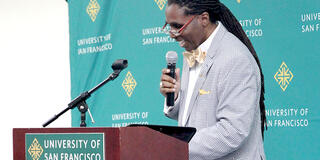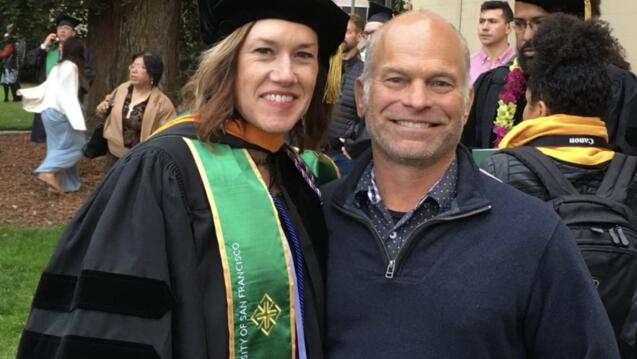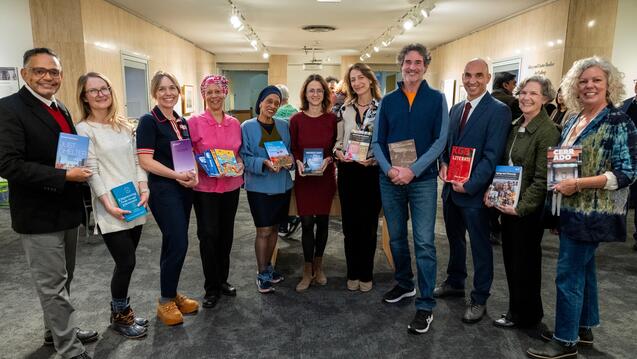Expose, Discuss and Act: The Mission to Save Homeless LGBT Youth

Dr. Richard Greggory Johnson III is the tenured professor, scholar and social equity advocate at the School of Management who recently organized the 15th annual Social Equity Leadership Conference (SELC) at USF - and gave a glimpse of what’s to come in his upcoming collection of articles on homeless LGBT youth.
In Johnson’s opening remarks at the SELC event, which hosted 150 public administration scholars and practitioners from across the nation, he explained he chose to come to USF because of the strong values the university upholds regarding social justice and social equity, which is what distinguishes it from other universities in San Francisco. “USF stands firmly for social equity,” Johnson said.
Even if you’re in psychology, or economics, or architecture - whatever field you’re in, you can partake of social equity"
~ Richard Greggory Johnson III
During the three-day conference, Johnson applied this lens of social equity in his own panel entitled Homeless LGBT Youth in a Time of Need, which focused on the epidemic of homeless LGBT youth, as well as the struggles and hardships they face when rejected from society, their communities and even their families.
Johnson explained that he first became interested in the topic of homeless LGBT youth a couple of years ago, “as a matter of public concern.” Johnson said he knew a man and a woman who were expelled from their homes by their parents when they were still minors, solely because they identified as LGBT. Johnson witnessed how this profound rejection had “a lasting impact on both of them” - they were not able to complete high school, went from one low wage job to the next, and in one case, struggled with substance abuse. “Neither of them ever bounced back … after being kicked out by their parents at 16 and 17 years old,” Johnson said.
In addition to moderating the panel, Johnson has written a well-received Huffington Post article on the topic. He also is working on a peer-reviewed collection of articles that features his work along with the work of other university scholars from all across the country. According to Johnson, he selected the contributing scholars, and the collection itself will be comprised of five or six articles, all of which he is editing, and one of which he and two other colleagues are writing in collaboration. The collection will be published in the Public Integrity Journal in December 2016. Other social equity related articles Johnson has written discuss topics on managing transgender discrimination and the advantages of diversifying the workplace.
Johnson writes of the crucial necessity for a “nationwide campaign” to “educate parents about the dangers that [come] with their lack of support” towards their children’s sexual identity. He considers this a key step “in order to proactively pull back on the prevalence of LGBT homeless youth.”
“Homeless LGBT youth should be a national concern, the same way that veterans affairs are taken seriously in this country,” Johnson said, explaining how the issue also sparked his interest because of the high suicide rates for homeless LGBT youth. Johnson cautioned that “Homeless LGBT may never reach their full potential if in fact they have no place to live and no support systems in place.”
“Hopefully [the upcoming collection of articles] will create this national dialogue regarding this important matter,” Johnson said, while expressing hope that such discussion has the power to unify communities throughout the United States. “It’s so criminal that young people, teenagers, are being kicked out of their homes for who they are, for who they choose to love,” Johnson said. “Homeless LGBT youth is something you don’t hear a lot about,” he offered, and mentioned in his panel that through the upcoming collection of articles, and as a professor, he is able to “expand this topic” that is of great importance to him.
In fact, Johnson’s panel at the conference featured a group of his graduate students who presented on a recent project they completed, which involved implementing gender-neutral bathrooms in homeless shelters. Johnson expressed that in the last several years of his university teaching - at both USF and, previously, the University of Vermont - this was one of the most successful student projects he oversaw. “This was a real world issue to which my graduate students were able to apply their skills from my public policy course along with their sense of humanity,” Johnson said. With the success of the project, Johnson said he will be replicating it for his graduate classes in the Fall. “Social equity is at the heart of what we do,” Johnson said, in regards to the School of Management.
Although the conference has to come to a close, Johnson explained that he believes in the educational mark it left on some attendees: “I think that some of my colleagues in other areas of the campus who have not heard the term ‘social equity,’ now have an understanding of it.” Social equity, to Johnson, is something he considers “interdisciplinary,” and that “even if you’re in psychology, or economics, or architecture--whatever field you’re in, you can partake of social equity.”


